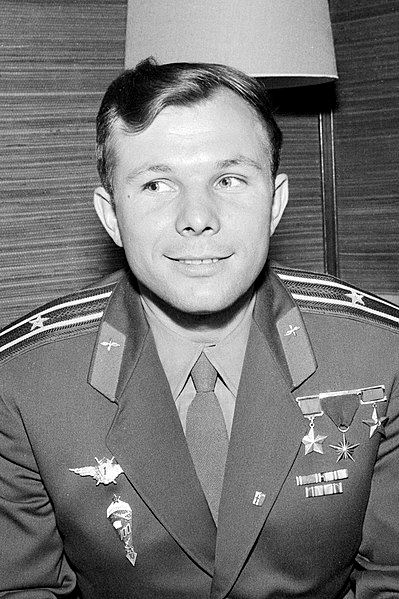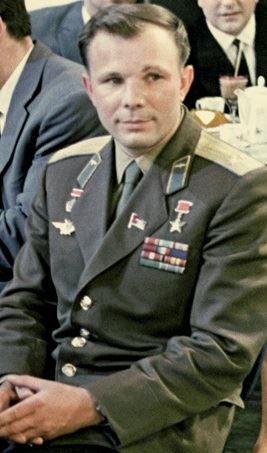 Yuri Gagarin's Take On Earthhttps://www.goodreads.com/author/quotes/690500.Yuri_Gagarin
Yuri Gagarin's Take On Earthhttps://www.goodreads.com/author/quotes/690500.Yuri_Gagarin https://commons.wikimedia.org/wiki/File:Yuri-Gagarin-1961-Helsinki-crop.jpgArto Jousi / /Suomen valokuvataiteen museo / Alma Media / Uuden Suomen kokoelma [Public domain]The 1960s, the race between the United States and the Soviet Union, began an uproar; the race against time, construction, and training. It was a race to see who would send one of their people into outer space first. The Soviet Union’s golden token to the technical dominance in space exploration was a young man named Yuri Gagarin. Gagarin was a well-respected Russian pilot and cosmonaut who displayed great strength in his capability of venturing out into an unknown, hazardous environment. Beginning in his early years, Gagarin had spent a multitude of years training for different pilot positions until eventually getting drafted into training to become the potential first individual on Earth to fly out beyond Earth’s atmosphere. After just nine months of training for the take-off of Vostok 1, the artificial satellite, Gagarin was voted by his fellow companions in training to conduct his mission on April 12, 1961 (“Yuri Alexeivich Gagarin”). Gagarin’s venture out into space displayed bravery in the name of benefitting the future technological advancements, his independence when faced with a more significant challenge, and the leadership he proved to show his peers and the rest of the world encompassing him in the name of modern technology, categorizes Gagarin as a hero to the world around him.
https://commons.wikimedia.org/wiki/File:Yuri-Gagarin-1961-Helsinki-crop.jpgArto Jousi / /Suomen valokuvataiteen museo / Alma Media / Uuden Suomen kokoelma [Public domain]The 1960s, the race between the United States and the Soviet Union, began an uproar; the race against time, construction, and training. It was a race to see who would send one of their people into outer space first. The Soviet Union’s golden token to the technical dominance in space exploration was a young man named Yuri Gagarin. Gagarin was a well-respected Russian pilot and cosmonaut who displayed great strength in his capability of venturing out into an unknown, hazardous environment. Beginning in his early years, Gagarin had spent a multitude of years training for different pilot positions until eventually getting drafted into training to become the potential first individual on Earth to fly out beyond Earth’s atmosphere. After just nine months of training for the take-off of Vostok 1, the artificial satellite, Gagarin was voted by his fellow companions in training to conduct his mission on April 12, 1961 (“Yuri Alexeivich Gagarin”). Gagarin’s venture out into space displayed bravery in the name of benefitting the future technological advancements, his independence when faced with a more significant challenge, and the leadership he proved to show his peers and the rest of the world encompassing him in the name of modern technology, categorizes Gagarin as a hero to the world around him.
Yuri Gagarin’s ability to be the first to venture into space, in order to further the Soviet Union’s position related to space exploration, displays his bravery. He was able to display this characteristic through his actions of going for the outcome of a world inspiration and aiding in the reach of technological supremacy in comparison to the United States. Gagarin begins to exhibit his leadership through bravery when he made his decision to proceed in leaving Earth to outer space in benefit to his country: “Yuri Gagarin was a Soviet Cosmonaut who was the first human to travel in space, making one complete orbit on Earth on April 12, 1961 […] Gagarin’s successful orbit of Earth was a technical triumph for the Soviet Union” (“Yuri Alexeivich Gagarin”). Given the presented idea, Gagarin’s mission circulated being the first human to orbit the face of Earth, while the Soviet Union was competing against the United States in correspondence to who could get to outer space first. Gagarin’s bravery and relentless work ethic enabled him to take on the challenge of venturing outside of Earth’s atmosphere. Gagarin, throughout his travels, continued to display his flow of bravery to the onlookers throughout the globe: “The Russian Cosmonaut Yuri Alekseyevich Gagarin […] was the first man to orbit the Earth in an artificial satellite and thus ushered the age of manned spaceflight” (“Yuri Alexeivich Gagarin”). Gagarin was able to make a full orbit around the planet Earth, making a full trip and return the same day, on April 12, 1961. His bravery became evident through his courageous actions of entering a satellite that could potentially have been insufficiently developed for him to enter into and fly off toward space. However, Yuri Gagarin grasped at the opportunity for promoting and advancement of future space exploration, helping to develop newer modifications to current technology. Gagarin’s constant drive and commitment allowed him to become a symbol of bravery and heroism at the time in the Soviet Union.
 https://commons.wikimedia.org/wiki/File:Alexey_Akindinov._Gagarin%27s_breakfast._2011-2012.jpgAlex Akindinov [CC BY-SA 4.0 (https://creativecommons.org/licenses/by-sa/4.0)]The launch of the Vostok 1 proved Gagarin as one of the most influential beings revolving around spacecraft, building the reputation of a hero to Gagarin’s peers and onlookers. Gagarin’s relentless work ethic during his training made his stand out in his field and reached his ultimate title of the first human in space: “In 1960, Gagarin was selected along with 19 other candidates for the Vostok 1 program” (Simple History). Throughout his training, Yuri Gagarin persevered through an abundance of training related to space and air travel, ultimately leading him to become the first man to travel beyond the atmosphere. His incomparable determination during the preparation made him excel compared to his peers, allowing his program to narrow down its candidates and select Gagarin as the final individual to enter space (Simple History). His actions displayed great leadership in his ability to contribute to his nation and take responsibility for a dangerous mission revolving around travel into a new environment. Upon Gagarin’s return, he was able to put his fame to positive use as a leading figure in the field he was most passionate for: “[...] he became a goodwill ambassador and a leader in Russia’s cosmonaut training program” (“Yury Gagarin”). Gagarin, deemed as the Union’s hero, began instructing those with similar intentions to reach the same goals that he had. Thus, Gagarin was able to take on a commander position where he could train cosmonauts to mark history in a similar fashion to which Gagarin had himself. He aimed to inspire those around him in the same field to work towards the impact of humans’ eventual infinite limits on space travel and exploration. Continuously, Gagarin’s tireless work ethic allows for the incorporation of bravery and independence to demonstrate his eternal power to guide others. In the essence of improving the space or cosmonaut training facility and techniques, Gagarin continually, before and after his mission, exhibited strong leadership in the tasks he has performed.
https://commons.wikimedia.org/wiki/File:Alexey_Akindinov._Gagarin%27s_breakfast._2011-2012.jpgAlex Akindinov [CC BY-SA 4.0 (https://creativecommons.org/licenses/by-sa/4.0)]The launch of the Vostok 1 proved Gagarin as one of the most influential beings revolving around spacecraft, building the reputation of a hero to Gagarin’s peers and onlookers. Gagarin’s relentless work ethic during his training made his stand out in his field and reached his ultimate title of the first human in space: “In 1960, Gagarin was selected along with 19 other candidates for the Vostok 1 program” (Simple History). Throughout his training, Yuri Gagarin persevered through an abundance of training related to space and air travel, ultimately leading him to become the first man to travel beyond the atmosphere. His incomparable determination during the preparation made him excel compared to his peers, allowing his program to narrow down its candidates and select Gagarin as the final individual to enter space (Simple History). His actions displayed great leadership in his ability to contribute to his nation and take responsibility for a dangerous mission revolving around travel into a new environment. Upon Gagarin’s return, he was able to put his fame to positive use as a leading figure in the field he was most passionate for: “[...] he became a goodwill ambassador and a leader in Russia’s cosmonaut training program” (“Yury Gagarin”). Gagarin, deemed as the Union’s hero, began instructing those with similar intentions to reach the same goals that he had. Thus, Gagarin was able to take on a commander position where he could train cosmonauts to mark history in a similar fashion to which Gagarin had himself. He aimed to inspire those around him in the same field to work towards the impact of humans’ eventual infinite limits on space travel and exploration. Continuously, Gagarin’s tireless work ethic allows for the incorporation of bravery and independence to demonstrate his eternal power to guide others. In the essence of improving the space or cosmonaut training facility and techniques, Gagarin continually, before and after his mission, exhibited strong leadership in the tasks he has performed.
 https://commons.wikimedia.org/wiki/File:Yuri_Gagarin_in_1963.jpgRIA Novosti archive, image #16849 / Khalip / CC-BY-SA 3.0 [CC BY-SA 3.0 (https://creativecommons.org/licenses/by-sa/3.0)]The voyage of Gagarin that leads to outer space manifests great strength that constructs and presents his character. Yuri Gagarin worked to benefit technological advancements, was able to cope with a challenge independently and reliably all while illuminating leadership to the rest of his community and world outside of the Soviet Union. From before training, during his mission, and ultimately until his unfortunate passing, Yuri Gagarin proved as a constant inspiration to those in the same field and motivated others to venture out into the uncertainties to pave pathways to success, constructing for improvement. Gagarin, following his return, was named a hero of his society in the eyes of the general public and aided in the development of modern training facilities: “Gagarin's importance in the Russian space program continues. Crews […] participate in a number of prelaunch traditions […] Gagarin is often held up as an example of character and heroism to younger children in Russia” (Redd). Yuri Gagarin’s ability to construct a new way of training for upcoming astronauts shows his passion for his field and the cause he had on the inhabitants of the planet. His character shows as an example of an idealistic figure to the eyes of the youth, given Gagarin was the admired personality in daily life. In the eyes of the community, nation, and the rest of the world, Gagarin continuously presents himself as a hero through the undying reminder of his hard work and bravery, creating a lasting legacy for Gagarin as a true hero of the Soviet Union.
https://commons.wikimedia.org/wiki/File:Yuri_Gagarin_in_1963.jpgRIA Novosti archive, image #16849 / Khalip / CC-BY-SA 3.0 [CC BY-SA 3.0 (https://creativecommons.org/licenses/by-sa/3.0)]The voyage of Gagarin that leads to outer space manifests great strength that constructs and presents his character. Yuri Gagarin worked to benefit technological advancements, was able to cope with a challenge independently and reliably all while illuminating leadership to the rest of his community and world outside of the Soviet Union. From before training, during his mission, and ultimately until his unfortunate passing, Yuri Gagarin proved as a constant inspiration to those in the same field and motivated others to venture out into the uncertainties to pave pathways to success, constructing for improvement. Gagarin, following his return, was named a hero of his society in the eyes of the general public and aided in the development of modern training facilities: “Gagarin's importance in the Russian space program continues. Crews […] participate in a number of prelaunch traditions […] Gagarin is often held up as an example of character and heroism to younger children in Russia” (Redd). Yuri Gagarin’s ability to construct a new way of training for upcoming astronauts shows his passion for his field and the cause he had on the inhabitants of the planet. His character shows as an example of an idealistic figure to the eyes of the youth, given Gagarin was the admired personality in daily life. In the eyes of the community, nation, and the rest of the world, Gagarin continuously presents himself as a hero through the undying reminder of his hard work and bravery, creating a lasting legacy for Gagarin as a true hero of the Soviet Union.
History, Simple, director. Yuri Gagarin, First Human in Space (1961). YouTube, YouTube, 19 Dec. 2017, www.youtube.com/watch?v=7iMa03BApcQ.
Redd, Nola Taylor. “Yuri Gagarin: First Man in Space.” Space.com, Space Created with Sketch. Space, 12 Oct. 2018, www.space.com/16159-first-man-in-space.html.
"Yuri Alexeivich Gagarin." Encyclopedia of World Biography, Gale, 1998. Biography In Context, https://link.galegroup.com/apps/doc/K1631002393/BIC?u=powa9245&sid=BIC&xid=ae441c8a. Accessed 21 Mar. 2019.
"Yury Gagarin." UXL Biographies, UXL, 2011. Student Resources In Context, https://link.galegroup.com/apps/doc/EJ2108100827/SUIC?u=powa9245&sid=SUIC&xid=eecf09fa. Accessed 28 Mar. 2019.
Page created on 4/11/2019 3:11:49 AM
Last edited 7/24/2019 1:47:29 AM
